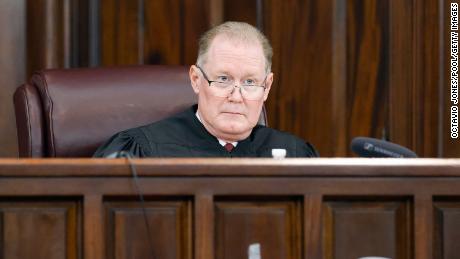Barbara Arnwine, president of the Transformative Justice Coalition, criticized defense attorneys for questions she said they asked to strike potential Black jurors, like if they supported Black Lives Matter or believed the criminal justice system treated Black people differently than White people.
Those questions targeted Black jurors for exclusion and it was disingenuous for the defense to “pretend this was about anything but getting rid of Black jurors,” she said, calling it “one of the most racially discriminatory and unfair processes I’ve seen in my life.”
“There is so much wrong with what has happened in this trial. It has been racialized from the beginning,” said Arnwine, who has accompanied Arbery’s father to court each day. “That was done purposefully by the defense.”
Arbery’s family and supporters were planning to march at 2 p.m. ET Thursday to demand justice in the case, which focuses on the killing of Arbery, a 25-year-old Black man who was jogging near Brunswick, Georgia, when he was fatally shot on February 23, 2020. Opening statements in the trial begin Friday.
Three men — father and son Gregory and Travis McMichael and William “Roddie” Bryan Jr. — face charges of malice and felony murder. The defendants, who have pleaded not guilty, also face charges of aggravated assault, false imprisonment and criminal attempt to commit false imprisonment.
Jury selection took two and a half weeks, ending in prosecutors Wednesday accusing defense attorneys of disproportionately striking qualified Black jurors and basing some of their strikes on race. Judge Timothy Walmsley said Wednesday he would allow the case to move forward, but he said the court “has found that there appears to be intentional discrimination” in the jury selection.
More than 26% of the 85,000 residents of Glynn County, where the trial is taking place, are Black, according to 2019 data from the US Census Bureau. About 69% are White.
Civil rights attorney Ben Crump, who represents Marcus Arbery Sr., also took issue with the jury selection, saying in a statement Friday that Arbery had been “denied justice,” saying in part, “His killers’ fate will be decided by a nearly all-white jury.”
“A jury should reflect the community,” Crump said.
Prosecutors, defense argue over ‘use of force’ expert witness
Arnwine’s comments came as prosecutors and the defense argued over several pre-trial motions in court, including what evidence and testimony may or may not be permitted during the trial.
Thursday’s hearing began with the state arguing for the court to exclude an expert witness the defense wanted to testify on the “use of force” training Travis McMichael previously received during his time in the US Coast Guard.
But McMichael’s law enforcement training — as well as that of Gregory McMichael, a former police officer and investigator for the local district attorney’s office — is “irrelevant,” prosecutor Linda Dunikoski said, because no one involved in Arbery’s death was a law enforcement officer or acting in that capacity.
“No law enforcement officers were actually involved in any of the events that led up to this indictment or the death of Mr. Arbery,” Dunikoski said. “And therefore, having someone come in and testify to law enforcement’s use off force is basically a bolstering situation and misleading and confusing to the jury.”
“Basically, it’s going to be confusing and highly prejudicial, because it’s irrelevant. It’s going to incorrectly let the jurors think that this was a legitimate citizen’s arrest,” she said, adding the use of force by a police officer would be reviewed on a completely different standard.
The defense disagreed, saying Travis McMichael had received repeated years of training on use of force that is not easily forgotten.
“You don’t just throw away your 10 years of training when you become a private citizen,” defense attorney Bob Rubin said, “especially when the training is drilled into Coast Guardsmen or other agents repeatedly so that it becomes muscle memory.”
A use of force expert, the defense argued, would provide the jury with context and “corroborate” the concepts Travis McMichael had been trained on.
Judge Walmsley ultimately granted the state’s motion, meaning the court would not allow the expert testimony.











